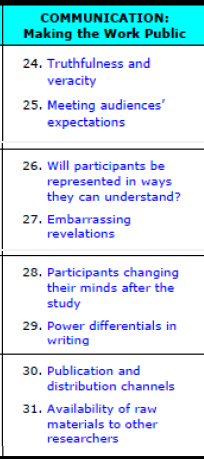VI. Representation
Power differentials in the field
Turning the gaze: The reporter and the witchdoctor
Point to ponder:
Witchdoctor: “Mr. Locke. There are perfectly satisfactory answers to all your questions. But I don’t think you understand how little you can learn from them. Your questions are much more revealing about yourself than my answer would be about me.”
• Why does the witchdoctor turn the gaze towards the reporter?
Debunking the researcher’s power of definition
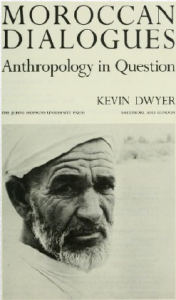
Moroccan Dialogues Cover (Foto: M. Schönhuth). from: Dwyer, Kevin& Faqir Muhammad. 1982. Moroccan Dialogues. Anthropology in Question. Baltimore, London: John Hopkins Univ. Press.
Kevin Dwyer locates ethnography in a process of dialogue in which interlocutors actively negotiate a shared vision of reality –with sometimes unpleasant results on the side of the participating ethnographer:
- (Dwyer): “To your mind, what is the most important subject that we talk about?”
- (Faqir): “I’m not concerned with a single one of your questions […]. I know these questions serve your purposes, not mine.”
- (Dwyer): “Well, what would you like to ask me about?”
- (Faqir): “It doesn’t matter to me, you could even ask me about snakes.” (Dwyer 1982, S. 225–226)
Good read:
• Dwyer, K.1979. The Dialogic of Ethnology. Dialectical Anthropology, 4(3), 205-224. [in his “Moroccan Dialogues” the chapters are composed in form of a dialogue…]
Power differentials in writing
“The Poetics and Politics of Ethnography”
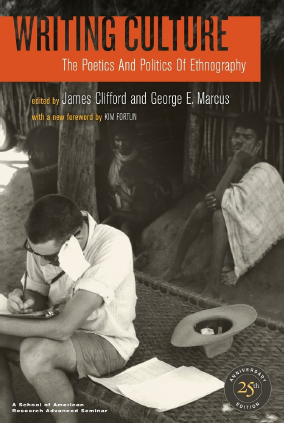
Writing Culture (Cover): Photo M. Schönhuth 2020.
- The power of personal experience in the field (“the witness”: “I saw it with my own eyes!”)
- The ability to interpret (“the interpreter”)
- The textual authority over research participants and recipients (“the writer”)
- “Ethnographic work has indeed been enmeshed in a world of enduring and changing power inequalities, and it continues to be implicated. It enacts power relations. But its function within these relations is complex, often ambivalent, potentially counterhegemonic.” (James Clifford 1986:9)
Point to ponder: Take a close look at the cover photo of “Writing Culture” (on the left): what does the scene tell us about the relationship between field researcher and research participant?
Balancing power differentials in writing
Giving voice – but how and to whom exactly?
Points to ponder:
Giving Voice
•”What if participants disagree with your assessment, an assessment that your data clearly supports?
• And what if competing factions within a community give you conflicting advice about how to tell their story?” [PERCS 2018; Section29 ]
• What do you think about sharing personal stories and interpreting pooled autoethnographic data as a non exploitative method of research?
Giving ‘Voice’
[..] what obligation do we have to ensure that we give voice to the people we work with. How can we ensure we do not co-opt their story?
- “[..]Brainstorm ways to make sure the voice of the participants is heard.
- One of the most obvious is to include direct quotes,but be sure to consider how easily these can be manipulated if you pick and choose according to your own agenda rather than theirs.
- [..]include your participants in the process of writing and revising. You could show drafts of your work to them and ask for input.” [PERCS 2018; Section29]
Another way of escaping the “[..] ethical issue of representing, speaking for, or appropriating the voice of others”, would be to use the method of collaborative autoethnography. [Lapadat 2017:589; cf. also Ellis et al. 2011]
- [..] a multivocal approach in which two or more researchers work together to share personal stories and interpret the pooled autoethnographicdata[..]a shift from individual to collective agency, thereby offering a path toward personally engaging, nonexploitative, accessible researchthat makes a difference.”, as Judity Lapadat stated recently in an article on the ethics of autoethnography [Lapadat 2017:589]
Good read:
• Roth reports on his research at a U.S. school from 2003 where researchers, teachers, and students not only did the research but also published the results together, thus contributing to a “transactional” praxis (Roth 2018: 31 http://dx.doi.org/10.17169/fqs-19.3.3061.
Collage, Polyphony, fieldwork as negotiation
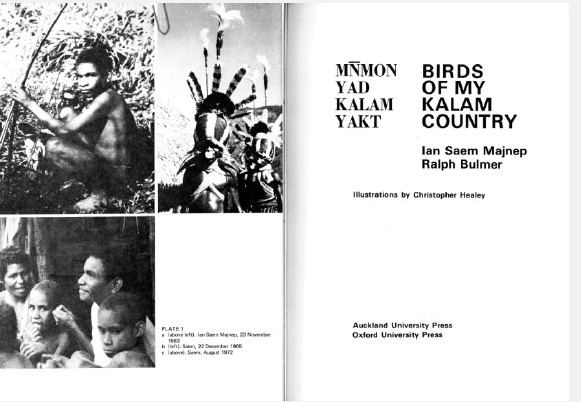
Majnep, Ian Saem and Ralph Bulmer, 1977. Birds of my Kalamcountry. Auckland: Auckland University Press and Oxford University Press. (Foto: M. Schönhuth 30/09/2020)
- Steven Tyler (Post-Modern Ethnography): “We better understand the ethnographic context as one of cooperative story making which, in one of its ideal forms, would result in a polyphonic text, none of whose participants would have the final word in the form of a framing story or encompassing synthesis -a discourse on the discourse.” (Tyler 1986: 126).
- Manjep/Bulmer Writing with equal rights: the respective contributions of ethnographer Ralph Bulmer and his New Guinean interlocutor Ian Saem Majnep are represented by different fonts (see photo on the left).
Good reads:
• Lusca, Emanuel, L..2008. Reflection on Vincent Crapanzano’s work “Tuhami: Portrait of a Moroccan”
• Dwyer, K.1979. The Dialogic of Ethnology. Dialectical Anthropology, 4(3), 205-224. [see his “Moroccan Dialoges” (previous slide) for a realisation of this idea: all chapters are written in form of a dialogue…]
• Pawley, Andrew. 2012. “How Saem became an ethnobiologist and writer: on the collaboration of Ian Saem Majnep and Ralph Bulmer”. Saem Majnep Memorial Symposium on Traditional Environmental Knowledge. University of Goroka.
Positionality
Decolonizing ethnography
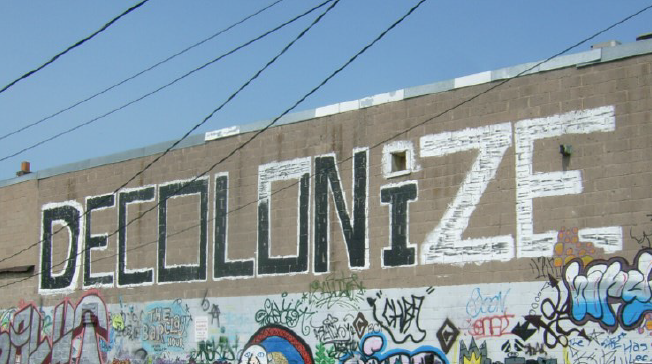
Gore Street graffitimural, ‘Decolonize’, Sault Ste. Marie, Ontario (Fungus Guy CC BY SA 4.0).
Point to ponder:
• At the time of writing, representations become controlled by the author, whose voice is privileged (Wright and Nelson 1995: 150).
• They pass over into the property of the Western world, becoming part of their ‘truth regimes’ (Foucault 1980) or ‘world ordering knowledge’ (Hobart 1993).
• But ‘does the anthropologist need to be an author?’ ‘Can’t there simply be a dialogue where the erstwhile objects become subjects and anthropologists follow the leads given by them’ (Jain 2000: 1)?
• Do you know of empirical examples where this decolonizing claim was taken seriously:
• -> in ethnographic fieldwork?
• -> in ethnographic writing?
Good read:
• Bejarano, Carolina Alonso, Lucía López Juárez, Mirian A. Mijangos García and Daniel M. Goldstein. 2019. Decolonizing Ethnography: Undocumented Immigrants and New Directions in Social Science. Durham, London: Duke University Press.
• Brodkin, Karen et al. 2011. Anthropology as White Public Space? American Anthropologist. 113,4, https://doi.org/10.1111/j.1548-1433.2011.01368.x. [“steps with which anthropology departments can create more inclusive social spaces that are owned equally by scholars of color and their white peers”].
• Takezawa, Yasuko. 2017. ‘Antiracist Knowledge Production: Bridging Subdisciplines and Regions’. American Anthropologist119 (3): 538–40. https://doi.org/10.1111/aman.12921.
Decolonizing knowledge production
Mission impossible?
Buzz Group:
• Those of you, who have already worked in North-South collaborations: what have been your experiences?
• Which assumptions, which resource decision-related, but also which very practical and pragmatic reasons maintain the structural disproportion – on the part of team members from the global North, but also those from the global South?
• Would there be realistic ways out of this dilemma (in the phases of research design, application process, implementation, (ethics) monitoring, evaluation, writing, publishing of the project?
- In collaborative North-South projects “..different layers of collaboration exist that implicitly confirm underlying logics of knowledge production,” as Vlassenroet (2020) states in the Bukavu series, a blog that seeks to give space to invisible voices in the production of knowledge.
- Despite a more and more prevailing participatory paradigm “[..] research agendas and guiding conceptual frameworks are usually still developed by a core group of researchers (in most cases based in the North) and taken as given by the rest of the research team (in most cases but not exclusively based in the South” (Vlassenroet 2020)
Good reads:
• GIC Network . (Silent) Voices Blog. The Bukavu Series
• Mudinga, Emery. 2020. We Barely Know These Researchers from the South! Reflections on Problematic Assumptions about Local Research Collaborators. The Bukavu Series (Blog). June 30.
What is being decolonial?
A statement by Houria Bouteldja, spokesperson of the PIR
Start the video at minute 5:00!
Who could be called a ‘decolonial person’?:
- “Muhammad Ali. Recall his comments when American journalists asked him why he refuses to join the army for the war in Vietnam. He answers: ‘No Viet-Cong has ever called me a nigger’. [..]
- My mother. The other day, I was reading some articles on the Internet, and she was looking at me. I told her: ‘It’s too bad that you can’t read French, you could have read like me.’ She sadly answered: ‘No, what I regret is that I can’t read Arabic. I could have read the Qur’an.’ My mother (and I’m more than a bit proud) is decolonial.” (Houria Bouteldja, in: Decolonizing Europe).
Good reads:
• Watch and discuss Muhammad Ali’s 1971 television interview on the question of whether, considering his popularity, he would accept an offer to become the American President (minute: 5:00-6:00).
• (The idea to employ this interview as an example of a decolonial stance originates from H. Bouteldja: https://www.decolonialtranslation.com/english/decolonizing-europe.html).
Balancing power differentials in publishing
Renouncing of the privilege of the last word: the tripartite peer review
Buzz Group:
• Would this three-fold peer review process be applicable in your own research context?
• What would be prerequisites for it?
• Think of the powerful role of gatekeepers in the field,
• ..of necessary time and budget resources, personal career goals and type of scientific employment on your side;
• ..the basic right of ‘freedom of research’.
To work against the scientific principle of the ‘privilege of the last word’, the authors of the Charter of Decolonial Research Ethics call for a tripartite peer review process:
- “[..]the first peer-review is made by the decolonial movements with whom the researcher has aligned herself.
- The second peer-review is the ‘traditional’ one that takes place with other academic peers.
- In cases where substantial changes have been made to the original manuscript [..], there is a third process of peer review inasmuch the text must be approved once more by the decolonial movements before being sent to publication.” (Decoloniality Europe. 2013).
Good read:
Decoloniality Europe. 2013. Charter of DecolonialResearch Ethics.
[Decoloniality Europe is a network of intellectuals and activists across Europe (https://decolonialityeurope.wixsite.com/decoloniality/the-movements). “The charter is principally a tool for decolonial social movements to use in their interaction with researchers interested in working with them, but can also be used by decolonial researchers. [It].. is concerned with how to put research in the favourof decolonial processes of change.”]
Representing interlocutors via visual media
Losing control of images after publishing
Points to ponder:
• This tutorial is also using photographic images to illustrate the content. Although the image rights, if they are not held by the author, have been clarified to the best of our knowledge (Creative Commons, or by asking the copyright holder for permission):
• Do you think it is ethically sound to use such images for illustration purposes, even if they were created in or for different contexts?
• Where do you see a limit (beyond the legal framework of image citation)?
Visual artist Rebecca Sakoun, in a workshop discussion on ‘undisciplined’ ethics, emphasizes that artists/authors can sometimes ‘lose control’ of their images:
- “Even photographs made in the most respectful of circumstances can be appropriated or used in vastly different contexts, to express very different ideas (or critiques).
- Images can surpass authorial intent, change, or move between categories.
- Copyright can be difficult and extremely expensive to protect, claims of ownership are not always upheld, and more and more images circulate and are ‘recycled’ in new and unprecedented ways.” [Sakounin Göttkeet al. 2019]
Good reads:
• Perry, Sarah and J.S. Marion. 2010. State of Ethics in Visual Anthropology. Visual Anthropology Review 26,2, 96-104. https://doi.org/10.1111/j.1548-7458.2010.01070.x.
• Stout, Noelle. 2014. Bootlegged: Unauthorized Circulation and the Dilemmas of Collaboration in the Digital Age. Visual Anthropology Reviews, 30,2, 177-187. [on her failed efforts to control the unauthorized circulation of her documentary film on sex workers in Havanna]. https://as.nyu.edu/content/dam/nyu-as/faculty/documents/StoutVARBootlegged.pdf. https://doi.org/10.1111/var.12047.
Communicating research results
- Various ethical issues (like “meeting audiences’ expectations, embarrassing revelations, participants changing their minds after the study,… : see left side)
- and practical tips when making your work public can be found in the Online-Module:
- “The Ethics of Fieldwork, edited by the “Program for Ethnographic Research & Community Studies” (PERCS) at ELON University, North Carolina
- at PERCS’ Website: https://www.elon.edu/u/academics/percs/resources/ethics/communication/
Tip:
Points for consideration when assigning authorship, acknowledging contributors, reporting to interlocutors, and negotiating the publication of research results – tailored to the cultures and societies of Aboriginal and Torres Strait Islander peoples – can also be found in the guide to applying the AIATSIS Code of Ethics 2020, Chapter 3.
